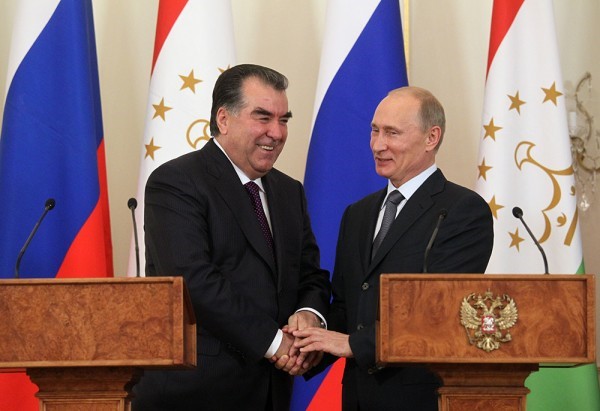At the end of April 2021, clashes erupted between Kyrgyzstan and Tajikistan over water rights in the disputed border area between them.[1] Russia attempted to restore peace and the presidents of both countries visited Vladimir Putin. Kommersant's columnist Maxim Yusin warns that the Russian organized Collective Security Treaty Organization had sustained a black eye as two members of the alliance were at daggers. Yusin thinks this should serve as a wake-up call about the dangers of an impoverished region in Russian's zone of influence becoming a breeding ground for Islamic radicalism (a danger compounded by the situation in Afghanistan). The regional tensions offer an opportunity for Russia's enemies to foment trouble that will stretch Russia's resources.
Yusin's analysis on the problems foreshadowed by the Kyrgyz-Tajik conflict follows below:[2]

Kyrgyzstan's President Sadyr Japarov with Vladimir Putin (Source: Gazeta.ru)
The President of Kyrgyzstan Sadyr Japarov's visit to Russia, as well as the visit by the President of Tajikistan Emomali Rahmon, which occurred immediately prior to it, is taking place against a tense background. The border clashes between the two countries, which effectively turned into a small war, have sent an alarming signal not only to the entire region but also to Moscow that bears geopolitical responsibility for Central Asia.

Putin with Tajikstan's President Rahmon (Source: Rg.ru)
The CSTO (a military bloc under Russian auspices) sustained a blow to its image. Two out of its six member-states engaged in bloody clashes with each other, resulting in 36 people were killed on the Kyrgyz side and 19 on the Tajik side. Dozens of houses, border posts and schools were burned, and more than 70 thousand civilians fled their villages.
SUPPORT OUR WORK

In Russia, Kyrgyzstan and Tajikistan are often perceived as twin brothers. Both republics have close ties with Moscow, in both Russian military bases are deployed, and both provide hundreds of thousands of migrant laborers to Russia. It was unimaginable that these two allied states would've sort things out so fiercely and resolve the issue of border delimitation with tanks and artillery.
This sad event is a reminder of how unstable and explosive the Central Asian region, home to 75 million people, remains. Often these people are very poor, which provides an ideal environment for the proliferation of Islamic radicalism. And this process is already underway and, considering the situation in neighboring Afghanistan, it will only get worse.
Central Asia is a traditional zone of influence for Moscow. So, if serious conflicts, clashes, riots, and ethnic cleansing will there, Russia will still have to intervene and restore order via military force (if it comes to that). The latter has happened more than once in recent decades.
Yet, it is not so difficult to inflame this country or another in the region (if one so desires). There are too many problems, pitfalls old grudges and slow acting time bombs. If we assume that some of Moscow's geopolitical opponents seeks to create additional problems for our country, getting it bogged down in conflicts, which force the Kremlin to dissipate its troops and overstretch its forces, then it would be hard to find a better proving ground than Central Asia.
The destabilization of the region, incidentally, will create problems not only for Moscow but for Beijing as well, because its important transport routes pass through it. In addition the Chinese get most of their energy resources from Central Asia.
In other words, opponents of Russia and China, which often are the same countries, have the opportunity to kill two birds with one stone (and with minimal costs to boot).
One doesn't require much of investment to provoke a crisis in one or several Central Asian states.
Some experts on the region, whom I consulted recently, forecast that serious crises in Central Asia, instigated by foreign countries, are only a matter of time. It is possible that this scenario has already come about, as illustrated by the Kyrgyz-Tajik border war.
It is very important for Moscow to figure out whether or not this is the case, whether or not there was a foreign footprint in these events (and if so, then whose exactly). [This] in order to know where to fight and with whom; how to minimize the consequences of similar future crises and to prevent Central Asia from becoming Russia's Achilles heel.

Maxim Yusin (Source: Ok.ru)




